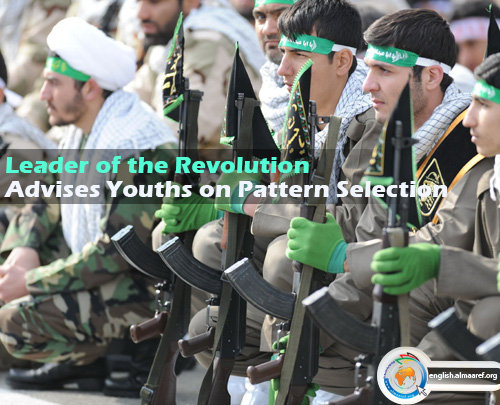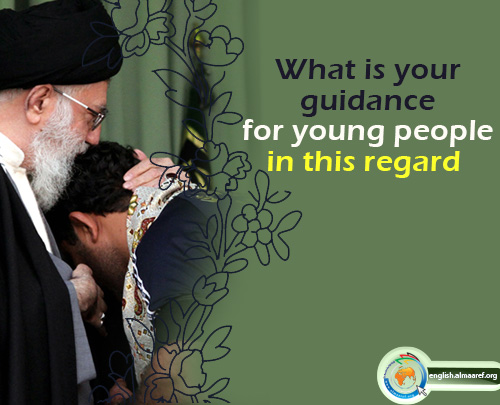* As female students how can we pattern ourselves on Hadrat Al-Zahraa’s life?
* Who were your own role models during the period of your youth?
That’s a good question. First of all I must say that no role model should be
presented to us and then we be told that it is our role model. This type of
stipulated and imposed Pattern role model is commonplace and uninteresting. We
must find the role model ourselves, that is we must scan the horizon of our
thoughts then we would see that among all of the figures that come to mind, that
which comes to our minds more often, that is our role model. I believe that it
is not difficult for a Muslim youth especially one who is acquainted with the
lives of Infallible Imams, the family of the Prophet and of the early Muslims of
Islam to find a role model, of which there are quite many.
You yourself fortunately mentioned Hadrat Al-Zahraa’s name in this context. I
would like to say a few words on sacred existence of Hadrat Al-Zahraa. Perhaps,
if seen against the background of the infallible Imams and other great
personalities it will provide a lead.
You, madam living in an era of technological, industrial and scientific
progress, in a big world a materialist civilization with a multitude of new
phenomena in life, you settle on a role model, for example, who lived l400 years
ago in what area would that role model be analogous to your present situation
that could be useful for you. For instance you want to know how went to
university? Or how she thought on world political affairs? These factors would
not be found.
Each human being has a number of fundamental characteristics that you should
clarify and search for your role model in them. How do you suppose, for
instance, a human being should act when faced with events in the environment?
Events in the Environment can sometimes be related to the era of the train, the
subway, the jet or the computer and sometimes it is related to an era where none
of these things exist. Nevertheless it is something which engulfs man.
Man can confront this matter in two different ways: one way is with a sense of
responsibility and other in an apethetic manner.
Having a sense of responsibility is of various types and divisions:
With what mentality and with what kind of perception toward future should he
have? Man has to search for these basic lines in a person who can be his pattern
and follow them.
Once had spoken about this matter in a lecture. Sometimes in our lectures no
attention is paid to noteworthy words and we miss them.
Look, Hadrat Al-Zahraa, for instance, was about six or seven years old that
event of the Sheb-e-Abitaleb occurred.
The Shu’ab-e- Abitaleb was a very difficult period in the history of Islam. The
public call of the Holy Prophet had begun, he had openly proclaimed this call
and little by little, the people of Mecca, especially the youth and gradually
gravitated towards the Holy Prophet. Leaders of the Taghut such as Abu-Lahab,
Abu – jahl, and others had no other choice but to exile the prophet and those
around him and so they did. A large number of people consisting of tens of
families among whom were the Holy prophet and his family, Abi-Talib -who himself
was one of the leaders of the Quraish’s heads –children and others were exiled
from Mecca, but where could they go? Abi Talib had some land –some miles away
from Mecca– which was located in a mountain fissure and was known as Sheb-e- Abi
Talib (“sheb” means fissure of mountain or narrow valley). We from Mashhad call
it “Bazeh”, an original Persian word.
Abi –Talib had a “Bazeh” or “Sheb” and they were told that it was better to go
there” Now think about it, in Mecca it is very hot in the day and very cold at
night quite an intolerable situation, and they lived there for three years only
God knows what hardships and hunger they suffered.
This was one of the most trying times for the Holy Prophet. In this period he
was not only responsible for managing a society, but he had to support himself
as well as the people who were suffering from severe hardship.
When a situation is pleasant, the people who have gathered around a leader are
satisfied they say “God bless him that provided us with such a nice situation,
but in hardship and in the face of uncertainty and they say “he guided us to
this and we did not wish for such a situation” of course people with strong
faith resist, but in the final analysis all the hardships are placed on the
shoulders of the Prophet. In the midst of such a severe situation Abi-Talib who
his supporter and hope and “Khadijah-e- Kubra” the greatest source of
psychological support for the Prophet both passed away within a week, this
unforseen calamity left the Holy Prophet completely alone.
I do not know if you have ever been in charge for a work collective to know what
responsibility really means? A situation like this could make a man feel quite
helpless. In such conditions take a look at Fatima Zahraa’s role. When man looks
at history he finds such instances pushed aside to the corners and unfortunately
no chapter is opened for them.
Fatima Zahraa was like a mother consultant and nurse to the Holy Prophet. That
is why she is called “the mother of her father” from the time she was only six
or seven years old. In Arabia and other hot environments girls grow faster
physically and mentally and the equivalent of her age would be like that of a
girl of twelve in our environment, accompanied by a heightened sense of
responsibility.
Couldn’t this be a pattern for youth that can encourage them to quickly feel
their responsibility toward matters in their environment, to quickly feel that
joy? She expended that excitement, that valuable asset which permeated her
existence in removing the dust of grief and displeasure from a father’s face who
was now about fifty years old and was almost old man. Could she not be a pattern
for youth? This is very important.
The next example is that of a married life and haring a husband when someone
thinks about wife hood they think about organizing meals in the kitchen,
cleaning rooms, making beds like in the old days, arranging the cushions and
then waiting for the husband to come home from the office or store. Being a
wife, however is not just this.
Just look at the married life of Fatima Zahraa (S.A.).
Fatima and Imam Ali (a.s.) had been married for about nine of the ten years that
the Holy Prophet spent in Medina. Had wars taken place almost sixty in most of
which of Imam Ali had participated.
Now look here, here is a lady who stays at home while her husband is involved in
fighting battles on a regular basis and without whose presence on the
battlefield the struggle would be paralyzed, so much did success on the
battlefield depend upon him.
At the same time they did not have an easy life, exactly as we have heard. It
said: The same things that we have heard “Because of love of God they feed
the poor, the slaves, the orphans, saying: truly we feed you for the sake of God
alone”.
Truly they lived a life of poverty although she was the daughter of a leader,
the daughter of the Holy Prophet, and with a sense of responsibility as well.
Do you know what a strong spirit a human being needs in order to equip such a
husband, to free his heart from the distractions of family problems, to reassure
him and to properly educate the children? You may say that Imam Hassan and Imam
Hussein (a.s.) were both Imams and had nature of Imamate (leadership), but
Zeinab (a.s.) was not an Imam. Fatima Zahraa had trained her during these nine
years. After the Holy Prophet’s demise she did not live very long. She was that
kind of housewife, she was that kind of spouse in this way they managed the home
and in this way this axis of family life is permanently written in history.
Can not this be a pattern for a young girl? A woman who is a housewife a lady
who is honored as a housewife this is very important.
After holy prophet’s demise she (Hadrat Al-Zahraa) comes to the mosque and gives
that startling lecture. Those of us who vocally give extempore speeches and
lectures will understand how extraordinary that lecture was. A girl of eighteen,
twenty or at most twenty four years old (of course her real age is not certain
because date of birth is in dispute) experiencing those hardships and calamities
comes to mosque and in the presence of a huge crowd of people she gives a
lecture whose every word would remain in the annals of history.
The Arabs are famous for having good memories. A man might come and compose an
elegy of eighty lines, and afterwards, ten people would write it. The elegies
which have survived originated in this way. Poems were read in social gatherings
and were recorded. Lectures and sayings were recorded in the same way, though
memorizing or writing and they have remained with us until today.
Empty talk does not remain in history neither would any kind of speech, lots of
words have been expressed, lots of poems hare been composed, but none have
survived and nobody pays to them any attention. That which history keeps in its
heart and after 1400 years would fill anyone with humility when they consider it
this demonstrates magnificence and in my opinion this can be a pattern for a
young girl.
You are correct, the fault is with those of us who are in charge of these
affairs. Of course by this I do not mean those in charge of governmental affairs
I mean spiritual and religious affairs, that we have not offered them to the
young generation as we would have liked, but you yourselves can do work in these
areas. There are similar cases to be seen in the lives of our Imams, as well.
Imam Jawad’s life is also a model. Imam Jawad (a.s.) despite his stature and his
magnificence died when he was only twenty five years old; these are not our
words but the words of history, a history written by non-shiites. This
magnanimous man during his infancy and his youth attained a magnificence before
the eyes of “Mamoun” and all the people. This is very important and could also
be seen as a model for all of us.
Of course, in our time we have a model as well. Imam Khomeini (May his spirit be
sanctified) is a model, these young volunteer forces are a model both those who
had been martyred and those who are still alive today. Of course man’s culture
makes it easy to speak about people who have been martyred or have passed away.
Just look and see what models we can find. We have seen people in the war who
had left their towns or villages as very average people. I had noted previously
that the previous regime could not elevate these potentials or even realize
them. In the previous regime these people were normal human beings, but in this
system they came to the battlefield which was a field of work and all of a
sudden their potentials were realized, they became “major generals” and later
they were martyred. Such cases are many.
Some years ago I was reading about them in a pamphlet entitled “My commander”
recounting the memories of young menabout their commanders on the battlefield. I
don’t know if this work was continued or not. They narrated very short stories
or brief memories, memories that manifest the magnificence of such a personality
to man. These could be patterns for us. And of course, in our scientific
personalities, athletic personalities, literary personalities, as well as among
our artistic personalities we may find patterns as well; personalities that are
truly notable.
Of course man chooses his model in accordance with his own criteria. You may
choose any pattern that you wish, but I ask you to consider piety as a
criterion, piety is something that cannot be neglected. It is necessary for a
worldly life as well as a spiritual one.
In response to your question as to what personalities had impressed me I must
say that there were quite a variety.
The person who impressed me very much in my youth was the late “Navab Safavi”. I
was about fifteen when he came to Mashhad. I was really impressed by him. When
he left Mashhad he was martyred in a terrible way only after some months had
passed. This deepened his impression upon us. Ladder Imam Khomeini profoundly
impressed me. Before I left for Qom and before the outbreak of the struggle I
had heard Imam Khomeini’s name, I had not yet seen him but I was interested in
him; because all the young men in Qom’s theological school took great interest
in his lectures which appealed to them. When I left for Qom I did not hesitate
to go to his classes.
From the start I attended his sessions and I continued to attend his classes for
as long as I stayed in Qom. He impressed me very much. My father and mother, of
course, impressed me as well. My mother especially so, she impressed me deeply.
She was quite an effective lady.
* The Leader & Youth. THE LEADER OF THE REVOLUTION’S VISIT WITH A GROUP OF YOUTH ON THE OCCASION OF YOUTH DAY




















